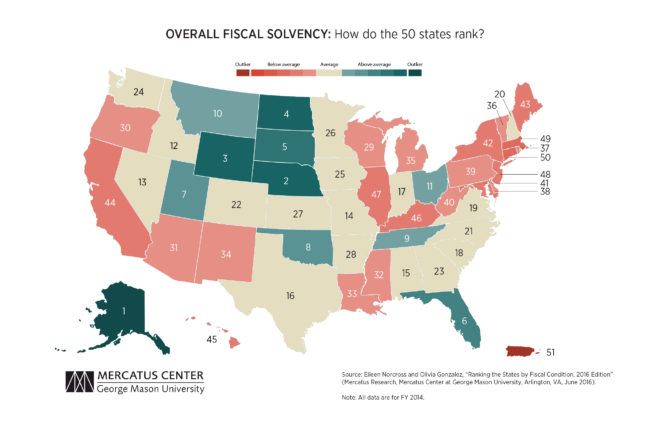Report bolsters governor’s call for budget caution
 With the June 15 deadline to finalize the 2016-17 state budget looming, Gov. Jerry Brown continues to push back at Democratic lawmakers’ call for him to revise his $123 billion spending plan to include new or expanded spending on social programs. Brown says that the state’s revenue roller-coaster makes such spending risky.
With the June 15 deadline to finalize the 2016-17 state budget looming, Gov. Jerry Brown continues to push back at Democratic lawmakers’ call for him to revise his $123 billion spending plan to include new or expanded spending on social programs. Brown says that the state’s revenue roller-coaster makes such spending risky.
Now the fourth-term governor has new evidence for his case. A comprehensive new report by the Mercatus Center at George Mason University that looked at every state’s audited financial documents from 2014 ranks California 44th in its ability to meet short-term bills and longer term obligations. The report makes the case both for caution on expanding new state spending and for putting as much as possible in the rainy-day fund that voters approved in 2014.
In two categories, the Golden State is in the middle of the back.
On budget solvency — which Mercatus defines as “can a state cover its fiscal year spending with current revenues, or does it have a budget shortfall?” — California ranked 23rd.
On service-level solvency — “how much ‘fiscal slack’ does a state have to increase spending if citizens demand more services?” — California ranked 28th.
Long-term picture for California is grim
But in three categories, the Golden State was far worse than the national average, buttressing Brown’s call to beef up the state’s rainy-day fund.
On long-run solvency — “can a state meet its long-term spending commitments? Will there be enough money to cushion it from economic shocks or other long-term fiscal risks?” — California ranked 46th.
On cash solvency — “does a state have enough cash on hand to cover its short-term bills?” — California ranked 47th.
On trust fund solvency — “how much debt does a state have? How large are its unfunded pension and healthcare liabilities?” — California ranked 42nd.
A recent New York Times story about Gov. Brown depicted him as having put California on solid fiscal ground and guided the state’s economy into a “period of prosperity.” The Times account suggested Brown and the Golden State could be a model for national Democrats.
The Mercatus study indicates that this narrative is based on perception more than hard data. Recent U.S. “U-6” unemployment data, which covers not just people without a job but people who work fewer hours than they want, backs up Mercatus. As of August, only six states had more residents unable to find jobs or full-time employment than California.
Chris Reed
Chris Reed is a regular contributor to Cal Watchdog. Reed is an editorial writer for U-T San Diego. Before joining the U-T in July 2005, he was the opinion-page columns editor and wrote the featured weekly Unspin column for The Orange County Register. Reed was on the national board of the Association of Opinion Page Editors from 2003-2005. From 2000 to 2005, Reed made more than 100 appearances as a featured news analyst on Los Angeles-area National Public Radio affiliate KPCC-FM. From 1990 to 1998, Reed was an editor, metro columnist and film critic at the Inland Valley Daily Bulletin in Ontario. Reed has a political science degree from the University of Hawaii (Hilo campus), where he edited the student newspaper, the Vulcan News, his senior year. He is on Twitter: @chrisreed99.
Related Articles
New influx of federal funding for CA mortgage relief
The federal government has supplied California with additional funds and time to continue its multi-year foreclosure relief program. The effort “intended to prevent
California’s roads improve, but still are troubled according to new study
SACRAMENTO – Despite its well-documented inefficiencies and travails, California’s Department of Transportation (Caltrans) has managed to improve the state’s system
Does CA suffer a doctor shortage?
Most of the criticism of the Affordable Care Act rollout has been aimed toward rate shocks, canceled insurance policies and




